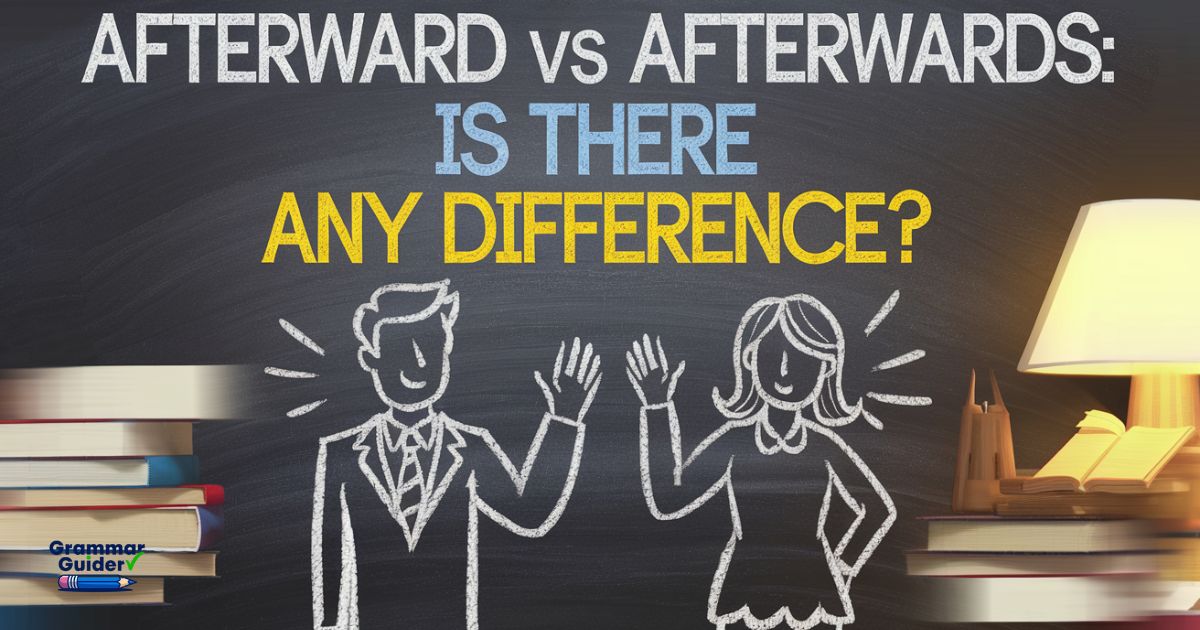When it comes to writing or speaking in English, the words afterward vs afterwards are often used interchangeably. However, many people wonder if there a difference between the two. Do they mean the same thing? Are they used in the same contexts, or are there subtle distinctions based on grammar, usage, or regional preferences.
In this article, we’ll take a deep dive into the meaning, usage, and spelling conventions of afterward vs afterwards. We’ll also explore their role as adverbs, provide some examples, and look into regional spelling norms to understand when and why you might choose one over the other.
What Does “Afterward” Mean?
Both afterward and afterwards are used as adverbs, indicating that something occurs after a particular event or time. They both answer the question “When?” by referring to something that happens subsequent to a specific event or action.
The word afterward is more commonly used in American English, where it serves as a concise, efficient way to refer to events happening later. It is the preferred form in informal and casual contexts in the United States. This word follows the adverbial suffix “-ward,” which is used in similar adverbs like forward, toward, and backward. In these cases, the suffix gives the word a directional or temporal meaning.
Example of Afterward in Context:
Email Example:
Dear Sarah,
Thank you for your insightful questions during our meeting. If you need more details, feel free to reach out to me afterward, and I’ll be happy to assist.
Best regards, John
In this example, afterward refers to the time after the meeting has concluded. It indicates a period that follows the event discussed.
What Does “Afterwards” Mean?
On the other hand, afterwards is generally preferred in British English. It carries the same meaning as afterward, indicating that something will take place after a particular event. However, afterwards includes an extra “s”, which makes it the more common form used in formal British writing.
Despite this, afterwards is still widely understood in American English and can be used as an alternative. Yet, the spelling with the “s” makes it more characteristic of British English.
Example of Afterwards in Context:
Email Example:
Dear Michael,
It was a pleasure meeting you earlier today. If you need further assistance, don’t hesitate to contact me afterwards. I’ll make sure to get back to you promptly.
Kind regards, Emma
Here, afterwards also refers to the time that comes after the meeting. In this case, the choice of afterwards might indicate that the writer is adopting a British English spelling and style.
Afterward vs Afterwards: The Difference in Usage
When you look closely at afterward vs afterwards, both words essentially serve the same function—they are adverbs indicating a time that follows an event. However, the main distinction between the two comes down to regional preferences, particularly between American English and British English.
- Afterward: This word is favored in American English. It is the preferred form in everyday speech and writing.
- Afterwards: More commonly used in British English, it has a slightly more formal flair in writing.
Example of the Difference in Usage:
American English (Afterward):
We will have a meeting first, and we can chat afterward about the next steps.
British English (Afterwards):
We will meet later today, and we can talk afterwards about our plans for tomorrow.
In both examples, the meaning remains identical, but the spelling choice reflects the regional spelling norms. Afterward sounds more natural in American English, while afterwards sounds more at home in British English.
Spelling Conventions: Why Does One Have an “S” and the Other Doesn’t?
The inclusion or omission of the “s” in these two words has its roots in the development of English spelling rules and conventions. Both words share the same adverbial suffix “-ward,” which is used in many directional or temporal adverbs. However, British English maintained the plural form of the adverb in many cases, whereas American English streamlined its spelling over time.
- American English has tended to simplify spellings and remove extra letters. For example, words like honor (instead of the British honour) and theater (instead of theatre) show this trend of simplification. Similarly, afterward reflects this simplification.
- British English generally keeps the s in adverbs like afterwards, following older patterns of spelling that were more detailed.
Are There Any Formal or Informal Differences?
In terms of formality, both afterward and afterwards are quite neutral and can be used in both formal and informal contexts. However, afterwards tends to be a bit more common in formal British writing.
In the United States, both words are used without much thought given to formality, although afterward is more frequent in casual conversations and emails.
Grammar: How Do Both Words Function?
Both afterward and afterwards are adverbs that describe when something happens, specifically referring to a time following an event. They can function in the same sentence structures and serve as time indicators.
For example:
- She left the office early, but I spoke with her afterward.
- They discussed their ideas, and afterwards, they planned the next steps.
Here, both words are used to describe what happens after the main event (leaving the office, discussing ideas).
Regional Preferences: When Should You Use Afterward or Afterwards?
The choice between afterward and afterwards boils down to which variant of English you are using and your audience. If you’re writing for an American audience, afterward will likely be your best bet. However, if you are targeting a British audience, afterwards may sound more natural.
It is also worth considering that while American English tends to favor afterward, afterwards is not incorrect in the U.S. In fact, it’s understood, even if it’s a bit more formal and rarely used in everyday conversation.
How to Choose Between Afterward and Afterwards?
If you’re unsure about which one to use, here are some practical guidelines:
- If you are writing for an American audience, it’s safe to use afterward.
- For British readers, afterwards is your best option.
- For formal contexts, such as academic papers or business emails, match your usage to the preferred form of the region.
- In informal contexts, either word is acceptable, but try to maintain consistency within your writing. If you start with afterward, stick with it, or vice versa.
Synonyms and Alternatives to Afterward/Afterwards
If you’d like to avoid repetition or make your writing more engaging, here are some synonyms and alternatives to both afterward and afterwards:
- Later
- Subsequently
- After that
- Then
- Following that
- In due course
- At a later time
These alternatives can help you vary your language while keeping the meaning intact.
Summary: Afterward vs Afterwards
| Aspect | Afterward (American English) | Afterwards (British English) |
|---|---|---|
| Meaning | Refers to time following an event | Refers to time following an event |
| Regional Preference | More common in American English | More common in British English |
| Spelling | No “s” at the end | Includes an “s” |
| Formality | Neutral in formal and informal writing | Slightly more formal in British contexts |
| Examples | We’ll meet afterward. | We’ll meet afterwards. |
| Synonyms | Later, Subsequently, Then | Later, Subsequently, After that |
FAQ’s
What the Difference Between “Afterward” and “Afterwards”?
“Afterward” is more common in American English, while “afterwards” is typically used in British English. Both words mean the same thing, referring to time following an event.
Can I Use “Afterward” in Formal Writing?
Yes, “afterward” is acceptable in formal writing, especially in American English. It’s perfectly fine for academic or business contexts.
Which Should I Use “Afterward” or “Afterwards”?
Use “afterward” for American audiences and “afterwards” for British audiences. Both are correct but depend on the regional preference.
Are “Afterward” and “Afterwards” Interchangeable?
Yes, both words are interchangeable in meaning, but usage depends on whether you’re following American or British English conventions.
Why Do “Afterward” and “Afterwards” Have Different Spellings?
“Afterward” follows the American trend of simplifying spelling, while “afterwards” retains the British spelling convention.
Can I Use Other Words Instead of “Afterward” or “Afterwards”?
Yes, alternatives like “later,” “subsequently,” or “after that” can be used to avoid repetition while maintaining the same meaning.
Conclusion
While afterward and afterwards are both used to refer to something that happens after a specific event, the main difference lies in regional spelling norms and usage preferences. American English tends to favor afterward, while British English leans toward.
There is no need to worry about making a mistake when using these two words they are both grammatically correct. The choice comes down to personal preference and the audience you’re writing for. Whether you choose afterward or afterwards, the key is to maintain consistency within your text. Keep your writing clear, concise, and suited to the audience you’re addressing.
By understanding the subtle differences between afterward and afterwards, you can make more informed decisions in your writing, ensuring that your message is well received by your readers—no matter where they are from.

Jacob Harrison is the seasoned writer behind Grammar Insights, with over nine years of experience in the field. Passionate about language, he shares practical tips and strategies to help readers enhance their grammar and writing skills. With a friendly approach, Jacob makes learning accessible and enjoyable for everyone.

